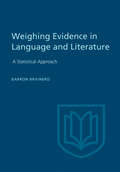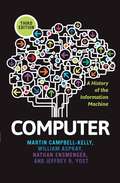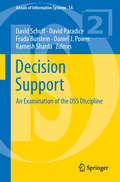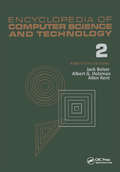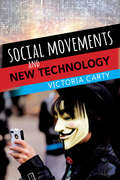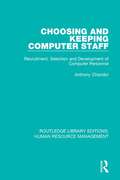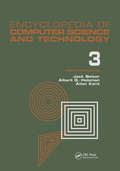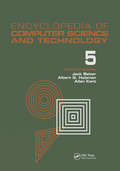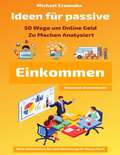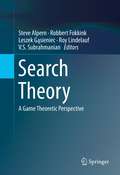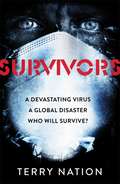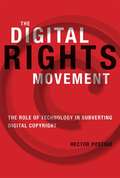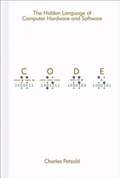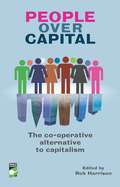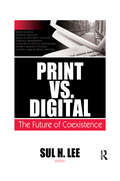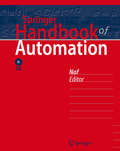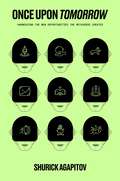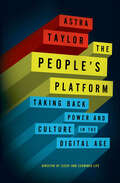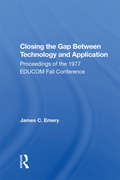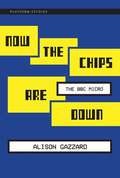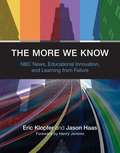- Table View
- List View
Weighting Evidence in Language and Literature
by Barron BrainerdIn recent years, there has been a tremendous development in the area of quantitative and statistical analysis of linguistic and literary data, generated, no doubt, by extensive advances in computer technology and their relatively easy availability to scholars. However, except for a few rather specialized examples, there has been no truly introductory text in statistics and quantitative analysis devoted to the needs of language scholars. This work was written especially to fill the gap. It introduces a mathematically naïve reader to those statistical tools which are applicable in modern quantitative text and language analysis, and does this in terms of simple examples dealing exclusively with language and literature. Exercises are included throughout.
Computer
by Martin Campbell-Kelly William Aspray Nathan Ensmenger Jeffrey R. YostComputer: A History of the Information Machine traces the history of the computer and shows how business and government were the first to explore its unlimited, information-processing potential. Old-fashioned entrepreneurship combined with scientific know-how inspired now famous computer engineers to create the technology that became IBM. Wartime needs drove the giant ENIAC, the first fully electronic computer. Later, the PC enabled modes of computing that liberated people from room-sized, mainframe computers. This third edition provides updated analysis on software and computer networking, including new material on the programming profession, social networking, and mobile computing. It expands its focus on the IT industry with fresh discussion on the rise of Google and Facebook as well as how powerful applications are changing the way we work, consume, learn, and socialize. Computer is an insightful look at the pace of technological advancement and the seamless way computers are integrated into the modern world. Through comprehensive history and accessible writing, Computer is perfect for courses on computer history, technology history, and information and society, as well as a range of courses in the fields of computer science, communications, sociology, and management.
Computer
by Martin Campbell-Kelly William Aspray Nathan Ensmenger Jeffrey R. YostComputer: A History of the Information Machine traces the history of the computer and shows how business and government were the first to explore its unlimited, information-processing potential. Old-fashioned entrepreneurship combined with scientific know-how inspired now famous computer engineers to create the technology that became IBM. Wartime needs drove the giant ENIAC, the first fully electronic computer. Later, the PC enabled modes of computing that liberated people from room-sized, mainframe computers.This third edition provides updated analysis on software and computer networking, including new material on the programming profession, social networking, and mobile computing. It expands its focus on the IT industry with fresh discussion on the rise of Google and Facebook as well as how powerful applications are changing the way we work, consume, learn, and socialize. Computer is an insightful look at the pace of technological advancement and the seamless way computers are integrated into the modern world. Through comprehensive history and accessible writing, Computer is perfect for courses on computer history, technology history, and information and society, as well as a range of courses in the fields of computer science, communications, sociology, and management.
Decision Support
by David Paradice Ramesh Sharda Daniel J. Power David Schuff Frada BursteinThis volume of Annals of Information Systems will acknowledge the twentieth anniversary of the founding of the International Society for Decision Support Systems (ISDSS) by documenting some of the current best practices in teaching and research and envisioning the next twenty years in the decision support systems field. The volume is intended to complement existing DSS literature by offering an outlet for thoughts and research particularly suited to the theme of describing the next twenty years in the area of decision support. Several subthemes are planned for the volume. One subtheme draws on the assessments of internationally known DSS researchers to evaluate where the field has been and what has been accomplished. A second subtheme of the volume will be describing the current best practices of DSS research and teaching efforts. A third subtheme will be an assessment by top DSS scholars on where the DSS discipline needs to focus in the future. The tone of this volume is one of enthusiasm for the potential contributions to come in the area of DSS; contributions that must incorporate an understanding of what has been accomplished in the past, build on the best practices of today, and be be integrated into future decision making practices. The primary questions raised by this volume are: What will information systems-based decision support entail in twenty years? What research is needed to realize the envisioned future of information systems-based decision support? How will the teaching of information systems-based decision support change over the next twenty years? What are the best practices of teaching in the decision support area that can be leveraged to best disseminate DSS knowledge advances to students and practitioners?
Encyclopedia of Computer Science and Technology: Volume 2 - AN/FSQ-7 Computer to Bivalent Programming by Implicit Enumeration (Computer Science And Technology Encyclopedia Ser.)
by Jack Belzer"This comprehensive reference work provides immediate, fingertip access to state-of-the-art technology in nearly 700 self-contained articles written by over 900 international authorities. Each article in the Encyclopedia features current developments and trends in computers, software, vendors, and applications...extensive bibliographies of leading figures in the field, such as Samuel Alexander, John von Neumann, and Norbert Wiener...and in-depth analysis of future directions."
Social Movements and New Technology
by Victoria CartyThe emergence of new information communication technologies--such as the Internet and social media networking sites and platforms--has strongly affected social movement activism. In this compelling and timely book, Victoria Carty examines these movements and their uses of digital technologies within the context of social movement theory and history. With an accessible and unique mix of theory and real-world examples, Social Movements and New Technology takes readers on a tour through MoveOn and Tea Party e-mail campaigns, the hacktavist tactics of Anonymous, global online protests against rapists and rape culture, and the tweets and Facebook pages that accompanied uprisings across the Arab world, Europe, and the United States. In each case study, the reader is invited to examine the movement, organization or protest and their use of digital tools through the lens of social movement theory. Discussion questions at the end of each chapter invite critical thinking and further reflection and debate.
Social Movements and New Technology
by Victoria CartyThe emergence of new information communication technologies-such as the Internet and social media networking sites and platforms-has strongly affected social movement activism. In this compelling and timely book, Victoria Carty examines these movements and their uses of digital technologies within the context of social movement theory and history. With an accessible and unique mix of theory and real-world examples, Social Movements and New Technology takes readers on a tour through MoveOn and Tea Party e-mail campaigns, the hacktavist tactics of Anonymous, global online protests against rapists and rape culture, and the tweets and Facebook pages that accompanied uprisings across the Arab world, Europe, and the United States. In each case study, the reader is invited to examine the movement, organization or protest and their use of digital tools through the lens of social movement theory. Discussion questions at the end of each chapter invite critical thinking and further reflection and debate.
Choosing and Keeping Computer Staff: Recruitment, Selection and Development of Computer Personnel (Routledge Library Editions: Human Resource Management)
by Anthony ChandorThis clear and detailed analysis, first published in 1976, of recruitment methods, staff development techniques, staff motivation, and organisational structures will be valuable to data processing managers and personnel officers alike. Its practical flavour and real understanding will also be welcomed by general management. The guidelines and detailed checklists will help cut the direct costs of recruiting and the often astonishingly high indirect costs of rapid staff turnover.
Encyclopedia of Computer Science and Technology: Volume 3 - Ballistics Calculations to Box-Jenkins Approach to Time Series Analysis and Forecasting (Computer Science And Technology Encyclopedia Ser.)
by Allen Kent Jack Belzer Albert G. Holzman"This comprehensive reference work provides immediate, fingertip access to state-of-the-art technology in nearly 700 self-contained articles written by over 900 international authorities. Each article in the Encyclopedia features current developments and trends in computers, software, vendors, and applications...extensive bibliographies of leading figures in the field, such as Samuel Alexander, John von Neumann, and Norbert Wiener...and in-depth analysis of future directions."
Encyclopedia of Computer Science and Technology: Volume 5 - Classical Optimization to Computer Output/Input Microform
by Allen Kent Jack Belzer Albert G. Holzman"This comprehensive reference work provides immediate, fingertip access to state-of-the-art technology in nearly 700 self-contained articles written by over 900 international authorities. Each article in the Encyclopedia features current developments and trends in computers, software, vendors, and applications...extensive bibliographies of leading figures in the field, such as Samuel Alexander, John von Neumann, and Norbert Wiener...and in-depth analysis of future directions."
Ideen Für Passive Einkommen: 50 Wege um Online Geld Zu Machen Analysiert
by Michael EzeanakaViele Menschen machen den Fehler, passives Einkommen mit dem schnellen Geld gleichzusetzen. Ich hoffe, dass Sie nicht denselben Fehler machen. Aus diesem Grund habe ich diesen Leitfaden über die gängigsten Möglichkeiten, passives Einkommen zu erzielen, zusammengestellt. Meine Absicht ist es, Ihnen bei der Entscheidung zu helfen, ob eine Gelegenheit für Sie geeignet ist oder nicht. Ich möchte Ihnen auch dabei helfen, die Mythen und Missverständnisse rund um diese einkommensschaffenden Methoden zu entlarven. Die Informationen und Analysen, die Sie in diesem Buch finden, beruhen auf Fakten und beobachtbaren Trends. Ich möchte sicherstellen, dass Sie auf dem richtigen Weg sind, wenn Sie sich schließlich entscheiden, einen Weg zu finden, passives Einkommen zu generieren.
Search Theory
by V. S. Subrahmanian Leszek Gąsieniec Steve Alpern Roy Lindelauf Robbert FokkinkSearch games and rendezvous problems have received growing attention in computer science within the past few years. Rendezvous problems emerge naturally, for instance, to optimize performance and convergence of mobile robots. This gives a new algorithmic point of view to the theory. Furthermore, modern topics such as the spreading of gossip or disease in social networks have lead to new challenging problems in search and rendezvous. Search Theory: A Game Theoretic Perspective introduces the first integrated approach to Search and Rendezvous from the perspectives of biologists, computer scientists and mathematicians. This contributed volume covers a wide range of topics including rendezvous problems and solutions, rendezvous on graphs, search games on biology, mobility in governed social networks, search and security, and more. Most chapters also include case studies or a survey, in addition to a chapter on the future direction of Search and Rendezvous research. This book targets researchers and practitioners working in computer science, mathematics and biology as a reference book. Advanced level students focused on these fields will also find this book valuable as a secondary text book or reference.
Survivors: The gripping, bestselling novel of life after a global pandemic
by Terry NationSurvivors of a global plague battle for life on an empty planet. A gripping vision of a post-apocalyptic world...'A fine piece of British post-apocalyptic fiction' 'Nation's novel is based on his original cult series...and is all the better for it, being far, far more gritty and realistic' SUNDAY SUNA virus has wiped out 95 per cent of the world's population in just a few weeks, leaving the remaining 5 per cent to stay alive in a world devoid of the most basic amenities - electricity, transport and medicine. The few survivors of the human race are forced to fall back on the most primitive skills in order to live and re-establish some semblance of law and order.Abby Grant, widowed by the plague, moves through this new dark age with determination, sustained by hope that her son, who fled his boarding school at the onset, has survived. She knows she must relearn the skills on which civilisation was built. With others, she founds a commune and the group return to the soil. But marauding bands threaten their existence. For Abby, there's a chance for a new life and love when she encounters James Garland, the fourteenth Earl of Woodhouse, who is engaged in a desperate fight to save his ancestral home. But more important, she must find her son.
Survivors: The gripping, bestselling novel of life after a global pandemic
by Terry NationSurvivors of a global plague battle for life on an empty planet. A gripping vision of a post-apocalyptic world...'A fine piece of British post-apocalyptic fiction' 'Nation's novel is based on his original cult series...and is all the better for it, being far, far more gritty and realistic' SUNDAY SUNA virus has wiped out 95 per cent of the world's population in just a few weeks, leaving the remaining 5 per cent to stay alive in a world devoid of the most basic amenities - electricity, transport and medicine. The few survivors of the human race are forced to fall back on the most primitive skills in order to live and re-establish some semblance of law and order.Abby Grant, widowed by the plague, moves through this new dark age with determination, sustained by hope that her son, who fled his boarding school at the onset, has survived. She knows she must relearn the skills on which civilisation was built. With others, she founds a commune and the group return to the soil. But marauding bands threaten their existence. For Abby, there's a chance for a new life and love when she encounters James Garland, the fourteenth Earl of Woodhouse, who is engaged in a desperate fight to save his ancestral home. But more important, she must find her son.
The Digital Rights Movement
by Hector PostigoThe movement against restrictive digital copyright protection arose largely in response to the excesses of the Digital Millennium Copyright Act (DMCA) of 1998. In The Digital Rights Movement, Hector Postigo shows that what began as an assertion of consumer rights to digital content has become something broader: a movement concerned not just with consumers and gadgets but with cultural ownership. Increasingly stringent laws and technological measures are more than incoveniences; they lock up access to our "cultural commons. " Postigo describes the legislative history of the DMCA and how policy "blind spots" produced a law at odds with existing and emerging consumer practices. Yet the DMCA established a political and legal rationale brought to bear on digital media, the Internet, and other new technologies. Drawing on social movement theory and science and technology studies, Postigo presents case studies of resistance to increased control over digital media, describing a host of tactics that range from hacking to lobbying. Postigo discusses the movement's new, user-centered conception of "fair use" that seeks to legitimize noncommercial personal and creative uses such as copying legitimately purchased content and remixing music and video tracks. He introduces the concept of technological resistance--when hackers and users design and deploy technologies that allows access to digital content despite technological protection mechanisms--as the flip side to the technological enforcement represented by digital copy protection and a crucial tactic for the movement.
Code: The Hidden Language of Computer Hardware and Software
by Charles PetzoldWhat do flashlights, the British invasion, black cats, and seesaws have to do with computers? In CODE, they show us the ingenious ways we manipulate language and invent new means of communicating with each other. And through CODE, we see how this ingenuity and our very human compulsion to communicate have driven the technological innovations of the past two centuries. Using everyday objects and familiar language systems such as Braille and Morse code, author Charles Petzold weaves an illuminating narrative for anyone who's ever wondered about the secret inner life of computers and other smart machines. It's a cleverly illustrated and eminently comprehensible story--and along the way, you'll discover you've gained a real context for understanding today's world of PCs, digital media, and the Internet. No matter what your level of technical savvy, CODE will charm you--and perhaps even awaken the technophile within.
People Over Capital
by Rob HarrisonCapitalism is failing and ordinary people are forced to pay the price. With such deep-rooted problems there is real hunger for alternative ways of organizing our economic system. Answering the question, "Is there a co-operative alternative to capitalism?" this book showcases fourteen responses from economists, academics, co-operators, politicians, and campaigners, exploring both the success and untapped potential of co-operatives. Each essay approaches from a new direction-from the flourishing open source movement to cases of co-operative success in different parts of the world.Rob Harrison has written and commented widely on social change issues for more than twenty years.
Print vs. Digital: The Future of Coexistence (Monographs From The Journal Of Library Administration Ser.)
by Sul H. LeeLibraries are currently confronted by the challenges of managing increasing amounts of electronic information. Print vs. Digital: The Future of Coexistence presents the expert perspectives of eight of America’s leading library administrators on ways to effectively manage digital flow and offers strategies to provide a level of coexistence between digital and print information. This excellent overview explores how to best balance print and electronic resources, and explores important issues such as the selection of electronic resources, improving access to digital information for a larger user base, and effective management of a library’s fiscal and personnel resources. Print vs. Digital: The Future of Coexistence discusses the various challenges libraries now face from the massive influx of digital resources, including the ways that information-seeking behaviors have changed, the search for synergies between print and digital, economics of news preservation, and whether or not the end of print journals is at hand. New ideas and technological advances are explored, including the diverse ways these improvements will impact the future. This well-referenced resource includes useful tables, figures, and photographs. Topics in Print vs. Digital: The Future of Coexistence include: cooperative collection development balance of print and electronic resources evolvement of digital resources in libraries change in research libraries factors influencing the selection of electronic resources disseminating information about scholarly collections impact of digital resources on research behavior and techniques design of digital libraries JSTOR effects of digital information on reference collections transition of print journals to digital formats Print vs. Digital: The Future of Coexistence is a thought provoking, insightful resource on the future of libraries, invaluable for acquisitions, reference, and collection development librarians; and senior and mid-level administrators such as deans, directors, and department heads for public, special, and academic libraries.
Springer Handbook of Automation
by Shimon Y. NofThis handbook incorporates new developments in automation. It also presents a widespread and well-structured conglomeration of new emerging application areas, such as medical systems and health, transportation, security and maintenance, service, construction and retail as well as production or logistics. The handbook is not only an ideal resource for automation experts but also for people new to this expanding field.
Once Upon Tomorrow: Harnessing the New Opportunities the Metaverse Creates
by Shurick AgapitovShurick Agapitov&’s Once Upon Tomorrow unpacks the sometimes vague concept of the metaverse and shares the opportunities that are and will be available within this new world.Thirty years ago, the advent of the internet changed the world. For the first time in human history, the collected knowledge of all mankind was freely available to every man, woman, and child on the planet with the click of a few buttons. Fifteen years ago, the world changed again with the widespread availability and adoption of smartphones that put the full power of the internet in the palm of our hands whenever we want and wherever we are. As monumental as these advancements were, they were just the warmup for the change that&’s coming next. In just a few years, we won&’t think of &“going on the internet&” to look up information and find entertainment. Instead, we&’ll already be in the internet, living, working, and playing in an endless virtual world that will turn everything we think we know about the internet on its head. Welcome to the Metaverse. In Once Upon Tomorrow, visionary tech CEO Shurick Agapitov dives deep into this new age of the internet by unpacking exactly what the Metaverse is and what it will become. It&’s not about pixels and computer chips; it&’s a total paradigm shift what will revolutionize how people interact, share stories, create and implement ideas, conduct business, and literally live their lives. The Metaverse will be the biggest change any of us have ever seen. Fortunately, Shurick Agapitov is here to take you by the hand and welcome you into this wild, wonderful new universe of opportunity.
The People's Platform: Taking Back Power and Culture in the Digital Age
by Astra Taylor“An invaluable primer for anyone seeking to understand why our networked world isn’t all that it is cracked up to be.” —The GuardianThe Internet has been hailed as an unprecedented democratizing force, a place where everyone can be heard and all can participate equally. But how true is this claim? In a seminal dismantling of techno-utopian visions, The People’s Platform argues that for all that we “tweet” and “like” and “share,” the Internet in fact reflects and amplifies real-world inequities at least as much as it ameliorates them. Online, just as off-line, attention and influence largely accrue to those who already have plenty of both.What we have seen so far, Astra Taylor says, has been not a revolution but a rearrangement. Although Silicon Valley tycoons have eclipsed Hollywood moguls, a handful of giants like Amazon, Apple, Google, and Facebook remain the gatekeepers. And the worst habits of the old media model—the pressure to seek easy celebrity, to be quick and sensational above all—have proliferated on the web, where “aggregating” the work of others is the surest way to attract eyeballs and ad revenue. When culture is “free,” creative work has diminishing value and advertising fuels the system. The new order looks suspiciously like the old one.We can do better, Taylor insists. The online world does offer a unique opportunity, but a democratic culture that supports diverse voices and work of lasting value will not spring up from technology alone. If we want the Internet to truly be a people’s platform, we will have to make it so.“Beautifully written and highly recommended.” —David Byrne, musician and author
Closing The Gap Between Technology And Application
by James C. EmeryThis book presents analyses, from three points of view, of the use of computing technology in higher education. It considers application areas including office automation, distributed academic computing, distributed administrative computing, instructional systems, and information resources.
Now the Chips Are Down: The BBC Micro
by Alison GazzardIn 1982, the British Broadcasting Corporation launched its Computer Literacy Project, intended "to introduce interested adults to the world of computers and computing." The BBC accompanied this initiative with television programs, courses, books, and software -- an early experiment in multi-platform education. The BBC, along with Acorn Computers, also introduced the BBC Microcomputer, which would be at the forefront of the campaign. The BBC Micro was designed to meet the needs of users in homes and schools, to demystify computing, and to counter the general pessimism among the media in Britain about technology. In this book, Alison Gazzard looks at the BBC Micro, examining the early capabilities of multi-platform content generation and consumption and the multiple literacies this approach enabled -- not only in programming and software creation, but also in accessing information across a range of media, and in "do-it-yourself" computing. She links many of these early developments to current new-media practices. Gazzard looks at games developed for the BBC Micro, including Granny's Garden, an educational game for primary schools, and Elite, the seminal space-trading game. She considers the shift in focus from hardware to peripherals, describing the Teletext Adapter as an early model for software distribution and the Domesday Project (which combined texts, video, and still photographs) as a hypermedia-like experience. Gazzard's account shows the BBC Micro not only as a vehicle for various literacies but also as a user-oriented machine that pushed the boundaries of what could be achieved in order to produce something completely new.
Principles of Digital Communication and Coding (Dover Books on Electrical Engineering)
by Jim K. Omura Andrew J. ViterbiWritten by two distinguished experts in the field of digital communications, this classic text remains a vital resource three decades after its initial publication. Its treatment is geared toward advanced students of communications theory and to designers of channels, links, terminals, modems, or networks used to transmit and receive digital messages.The three-part approach begins with the fundamentals of digital communication and block coding, including an analysis of block code ensemble performance. The second part introduces convolutional coding, exploring ensemble performance and sequential decoding. The final section addresses source coding and rate distortion theory, examining fundamental concepts for memoryless sources as well as precepts related to memory, Gaussian sources, and universal coding. Appendixes of useful information appear throughout the text, and each chapter concludes with a set of problems, the solutions to which are available online.
The More We Know
by Eric Klopfer Jason HaasIn 2006, young people were flocking to MySpace, discovering the joys of watching videos of cute animals on YouTube, and playing online games. Not many of them were watching network news on television; they got most of their information online. So when NBC and MIT launched iCue, an interactive learning venture that combined social networking, online video, and gaming in one multimedia educational site, it was perfectly in tune with the times. iCue was a surefire way for NBC to reach younger viewers and for MIT to test innovative educational methods in the real world. But iCue was a failure: it never developed an audience and was canceled as if it were a sitcom with bad ratings. In The More We Know, Eric Klopfer and Jason Haas, both part of the MIT development team, describe the rise and fall of iCue and what it can teach us about new media, old media, education, and the challenges of innovating in educational media. Klopfer and Haas show that iCue was hampered by, among other things, an educational establishment focused on "teaching to the test," television producers uncomfortable with participatory media, and confusion about the market. But this is not just a cautionary tale; sometimes more can be learned from an interesting failure than a string of successes. Today's educational technology visionaries (iPads for everyone!) might keep this lesson in mind.
